The best performing Asian markets
Asian stock markets used to take their lead from Wall Street, moving up or down in tandem with the S&P 500. But not any more. As US markets drift sideways, Asia is on the up as investors flood in. Cris Sholto Heaton looks at what's going on, and picks out the best performing markets in Asia.

Get the latest financial news, insights and expert analysis from our award-winning MoneyWeek team, to help you understand what really matters when it comes to your finances.
You are now subscribed
Your newsletter sign-up was successful
Want to add more newsletters?

Twice daily
MoneyWeek
Get the latest financial news, insights and expert analysis from our award-winning MoneyWeek team, to help you understand what really matters when it comes to your finances.

Four times a week
Look After My Bills
Sign up to our free money-saving newsletter, filled with the latest news and expert advice to help you find the best tips and deals for managing your bills. Start saving today!
Some surprising things have been happening in Asian markets over the last couple of months.
Stocks around the world have been moving together in lockstep since the crisis began. They sold off together, with Asia and emerging markets falling more than the S&P500. They then recovered together, with Asia rising further, before selling off more severely as investors began to get jumpy again at the start of this year.
But since the latest attack of nerves in late May, things have been taking a different course
MoneyWeek
Subscribe to MoneyWeek today and get your first six magazine issues absolutely FREE

Sign up to Money Morning
Don't miss the latest investment and personal finances news, market analysis, plus money-saving tips with our free twice-daily newsletter
Don't miss the latest investment and personal finances news, market analysis, plus money-saving tips with our free twice-daily newsletter
America goes one way, Asia goes the other
The chart below shows the performance of the MSCI Asia ex-Japan (the orange line) and the S&P 500 (the white line) over the past year. The two often rise and fall on the same day. But the overall trend is rather different. Asia has been still heading upwards, while the S&P 500 has drifted sideways.
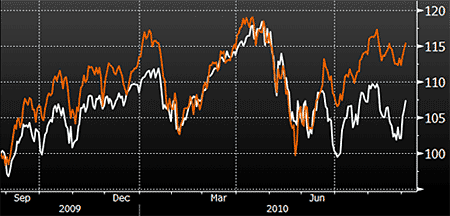
That's encouraging for those of us who hope to see Asia shake off the Wall Street leash effect and get started on a new bull market. However, it's not just Asia versus the West. There are some interesting divergences within the Asian markets as well.
Where's hot, and where's not
First, let's take Hong Kong. As you can see below, the Hang Seng hasn't done terribly well of late, falling steadily since the start of the year.
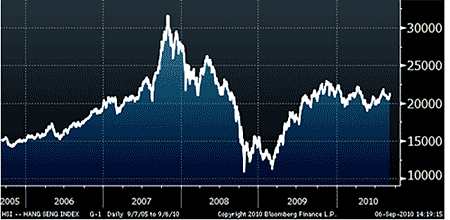
It's much the same picture with Taiwan. Investors are not completely happy with the China story right now, amid signs that the economy is slowing. As I've noted before, I find it hard to credit some pundits' descriptions of China being in a 'bubble' given what's actually happened in the markets.
The mainland China indices are a slightly different animal. They are largely closed to foreign investors and march to a different beat to the rest of the world (see my piece on Chinese A shares for more). Still, the performance of these has been weak as well. The CSI300 currently trades at half its 2007 peak and has fallen 17% since the start of the year.
However, the Shenzhen market China's second mainland exchange, which is more geared towards small and medium-sized private business than Shanghai has done rather better (see chart below).
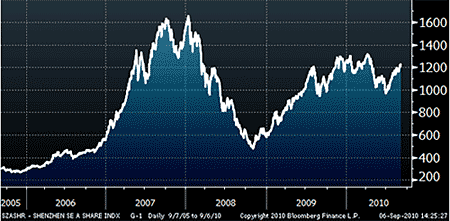
It's too early to read much into this the mainland markets have always tended to run on sentiment rather than fundamentals, but there are at least two possible reasons for the divergence. First, perhaps, concerns about the remaining overhang of state-owned shares to be sold off in the years ahead are still depressing Shanghai. Or perhaps Chinese investors are starting to favour smaller firms over the biggest (and most policy-sensitive) giants such as the state-controlled banks.
Elsewhere, you can see that Korea has done better than Hong Kong and Taiwan, although it's by no means the best performer in Asia.
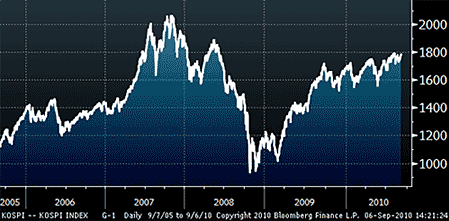
Meanwhile, Japan's market continues to go from bad to worse, even as the yen strengthens. Japan doesn't really fit well into this discussion. Its drivers are very different to emerging Asia. I'll take another look at it in the next couple of weeks, once we know whether the latest bout of political infighting will result in yet another change of prime minister.
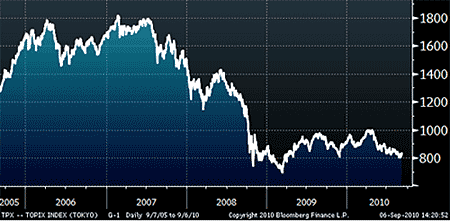
Investors are flooding back to Southeast Asia
So much for Northeast Asia. It's when we look further around the region that we realise there's a very pronounced north-south divide. These are the markets that have been responsible for Asia's overall outperformance.
Top of the list is Indonesia. Investor attitudes to this economy have completely switched. Foreign money continues to flood in, making it one of the few markets around the world to top its pre-crisis peak.
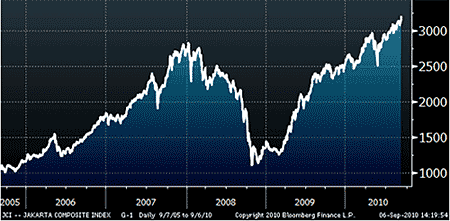
Malaysia has almost done the same, as has the Philippines. India's recent performance has been slightly less impressive, but still very robust. Singapore has benefitted less than its less advanced neighbours, but is still beating Hong Kong, its closest peer and rival financial centre.
But perhaps most striking of all is the performance of Thailand.
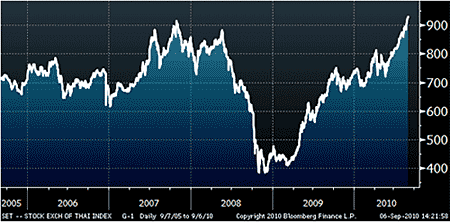
Given the ongoing political problems culminating in the violence in Bangkok in April and May I had expected the Thai market to struggle. Instead, it's gone from strength to strength.
Expert tips & advice for investing in Asia! Claim your FREE guides from MoneyWeek that include:
- How to go about investing to Asia
- Which brokers to use to buy foreign shares
What is especially interesting about this is that it doesn't seem to simply reflect foreigners taking the crisis (and Thailand's low valuations) as a signal to invest. Foreign flows have been crucial to many of the best-performing Asian markets, such as Indonesia. But in Thailand, local institutions have been accounting for a growing share of turnover in the last couple of years. The importance of foreign buyers has actually fallen.
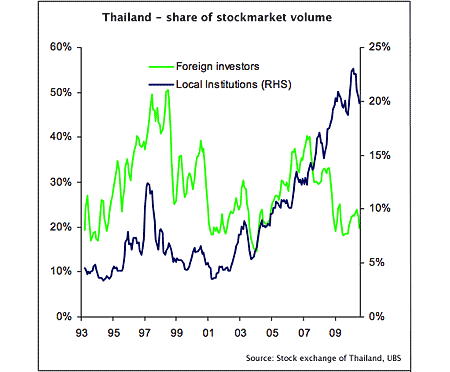
This looks like an early pointer to Asia's future. As the region becomes richer and people have more to save and invest, local flows will become far more important in determining the direction of Asian markets. We may not have decoupling yet, but we have the first signs that in a decade or so Wall Street will have far less impact on the direction of global markets.
Southeast Asia's biggest disappointment
The big disappointment in Southeast Asia has been Vietnam. When this market touched bottom in early 2009, I had hoped that this would be a fairly definitive low and we'd see a strong recovery. It hasn't worked out this way at all.
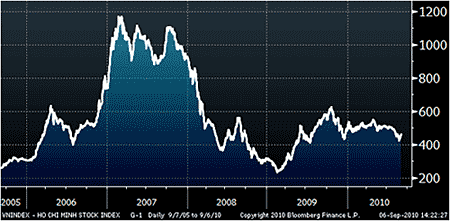
Blame inconsistent policymaking, which is causing foreign investors to stay away. Growth is fairly solid and inflation seems to be coming down again. But the government is not presenting an image of competence and consistency.
Some political infighting and a short-term focus are evident ahead of the communist party conference in January. The dong has been devalued three times in the last year and a further move looks quite likely. I still think Vietnam has excellent medium-to-long term prospects but it's not clear when it will begin attracting investors again.
And one of its roaring successes
It's a very different story in Sri Lanka. With the brutal war against the Tamil Tigers over, the country has enormous potential. There are real reasons to be concerned about the autocratic government there and whether it will make the best of this opportunity. But investors are starting to pay attention and the market has soared over the last year.
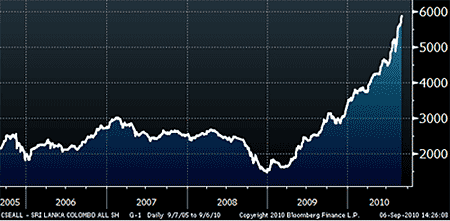
Unfortunately, as far as I know there's no easy way for retail investors to get access to Sri Lanka. If any readers are aware of an obscure fund or company with high exposure, I'd be interested to hear of it. (There are a handful of funds, but these are aimed at high net worth individuals and typically require a minimum investment of $100,000.)
Valuations are still reasonable
So what are the prospects for Asia now? The good news is that valuations don't generally look stretched.
The MSCI Asia ex-Japan index currently trades on a price/book ratio of 1.93, in line with the long-run average. Emerging market valuations are certainly starting to trade closer to those of developed markets, as the price/book chart below shows (the orange is the MCI Asia ex Japan, white is the S&P500). But there's no reason why they can't continue or even trade at a premium.
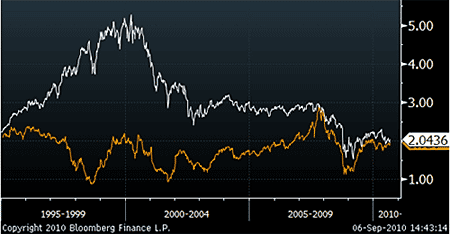
Emerging markets have traditionally been considered riskier than developed ones. As a result, investors have taken the view that they should trade at a discount. But most Asian economies have decent balance sheets, better growth prospects and are on an improving trend. So that assumption can be challenged.
For individual markets, valuations vary. Some are higher by historical standards: for example, Indonesia is on an estimated p/e of 15.7. Thailand long one of Asia's cheaper markets because of political problems is on 13.5. That's no cheaper than Hong Kong or Taiwan, although still a discount to most of Southeast Asia.
Still, nothing is obviously overvalued. On estimates, India is the most expensive at 17.7. But India has always tended to be more expensive than the rest of the region. So this isn't out of line with the past or more importantly, with anything that can be justified by fundamentals.
The next few months could be trickier for markets everywhere, given fears that the global economy is slowing. Problems with the eurozone's smaller economies haven't gone away. And some of the markets that have had the biggest run up could well be vulnerable to a pull-back.
But now that Asian markets are showing a bit more independence, there's every reason to hope this will continue. And plenty of reasons to believe emerging markets will continue to outperform the struggling developed ones.
This article is from MoneyWeek Asia, a FREE weekly email of investment ideas and news every Monday from MoneyWeek magazine, covering the world's fastest-developing and most exciting region. Sign up to MoneyWeek Asia here
Get the latest financial news, insights and expert analysis from our award-winning MoneyWeek team, to help you understand what really matters when it comes to your finances.

Cris Sholt Heaton is the contributing editor for MoneyWeek.
He is an investment analyst and writer who has been contributing to MoneyWeek since 2006 and was managing editor of the magazine between 2016 and 2018. He is experienced in covering international investing, believing many investors still focus too much on their home markets and that it pays to take advantage of all the opportunities the world offers.
He often writes about Asian equities, international income and global asset allocation.
-
 The downfall of Peter Mandelson
The downfall of Peter MandelsonPeter Mandelson is used to penning resignation statements, but his latest might well be his last. He might even face time in prison.
-
 Default pension funds: what’s in your workplace pension?
Default pension funds: what’s in your workplace pension?Default pension funds will often not be the best option for young savers or experienced investors